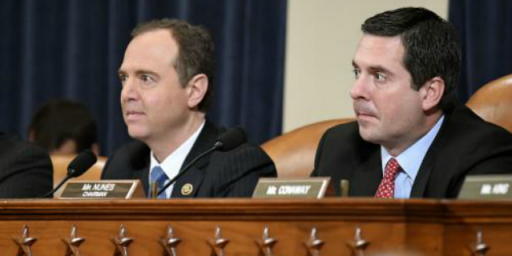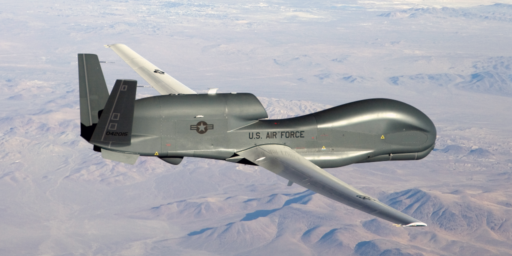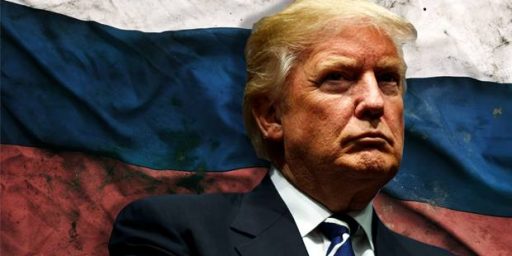President Obama’s Troubling Justification For Targeted Killings
The Obama Administration has given us a peek at its legal arguments for targeted killings and they are troubling to say the least.
For years now, various media organizations and the ACLU have attempted to force the Obama Administration to reveal the legal justification behind the targeting of American citizens overseas accused of committing terrorist acts, or cooperating with those who do. This phenomenon first started with the killing of Anwar al-Awlaki via a drone strike in Yemen, a targeted assassination that the Administration carried out after resisting efforts to require them to provide some sort of proof in a court of law to support the conclusions that led to the signing of al-Awaki’s death warrant. Since then, we’ve learned about the existence of Presidential “kill lists” and a tight circle of national security advisers who are charged with making the decision of who should be targeted by American drones. Throughout all of this, the Administration has repeatedly claimed “national security” in response to any request to reveal the criteria it uses to determine when a person, most especially an American citizen, would be targeted under this policy. Now, though, we have a report from NBC News that details at least some of these criteria, and it’s enough to raise a serious set of concerns:
A confidential Justice Department memo concludes that the U.S. government can order the killing of American citizens if they are believed to be “senior operational leaders” of al-Qaida or “an associated force” — even if there is no intelligence indicating they are engaged in an active plot to attack the U.S.
The 16-page memo, a copy of which was obtained by NBC News, provides new details about the legal reasoning behind one of the Obama administration’s most secretive and controversial polices: its dramatically increased use of drone strikes against al-Qaida suspects, including those aimed at American citizens, such as the September 2011 strike in Yemen that killed alleged al-Qaida operatives Anwar al-Awlaki and Samir Khan. Both were U.S. citizens who had never been indicted by the U.S. government nor charged with any crimes.
The secrecy surrounding such strikes is fast emerging as a central issue in this week’s hearing of White House counterterrorism adviser John Brennan, a key architect of the drone campaign, to be CIA director. Brennan was the first administration official to publicly acknowledge drone strikes in a speech last year, calling them “consistent with the inherent right of self-defense.” In a separate talk at the Northwestern University Law School in March, Attorney General Eric Holder specifically endorsed the constitutionality of targeted killings of Americans, saying they could be justified if government officials determine the target poses “an imminent threat of violent attack.”
But the confidential Justice Department “white paper” introduces a more expansive definition of self-defense or imminent attack than described by Brennan or Holder in their public speeches. It refers, for example, to what it calls a “broader concept of imminence” than actual intelligence about any ongoing plot against the U.S. homeland.
“The condition that an operational leader present an ‘imminent’ threat of violent attack against the United States does not require the United States to have clear evidence that a specific attack on U.S. persons and interests will take place in the immediate future,” the memo states.
Instead, it says, an “informed, high-level” official of the U.S. government may determine that the targeted American has been “recently” involved in “activities” posing a threat of a violent attack and “there is no evidence suggesting that he has renounced or abandoned such activities.” The memo does not define “recently” or “activities.”
As in Holder’s speech, the confidential memo lays out a three-part test that would make targeted killings of American lawful: In addition to the suspect being an imminent threat, capture of the target must be “infeasible, and the strike must be conducted according to “law of war principles.” But the memo elaborates on some of these factors in ways that go beyond what the attorney general said publicly. For example, it states that U.S. officials may consider whether an attempted capture of a suspect would pose an “undue risk” to U.S. personnel involved in such an operation. If so, U.S. officials could determine that the capture operation of the targeted American would not be feasible, making it lawful for the U.S. government to order a killing instead, the memo concludes.
Obviously, the biggest concern here is the fact that the memo presents a fairly broadly open-ended definition of what an “imminent” attack actually is. It certainly doesn’t have the same meaning that it does in general conversation. This seems especially true given the fact that the al-Awlaki killing occurred nearly two years after the terrorist attack he was accused of masterminding, the 2009 “Underwear Bomber” attack. If we’re talking about the plot to apparently send bombs disguised as toner cartridges into the United States from Yemen, the killing took place a years after the alleged threat. Since we have never been privy to any of the evidence that the Administration supposedly had against him, it’s hard to see how he was the kind of “imminent” threat that ordinary use of the word would suggest or why it wouldn’t have been just as acceptable to capture him and bring him back to the United States for trial.
Ron Fournier points out many of the questions that arise from these memo:
1. Where does this slippery slope end? If killing Americans with no due process is OK when their alleged crime is consorting with al-Qaida, it’s not a huge intellectual leap to give government officials the same judge-and-jury authority over other heinous acts such as mass murder, drug-trafficking and y pornography.
2. Shouldn’t there be a higher standard? In the torture debate, many Americans seemed to buy the concept that extreme measures might be necessary to prevent an imminent attack against the U.S. Should the standard be higher for torture than murder?
3. What makes a targeting killing lawful? Holder told the public months ago that killing Americans can be justified if “capture is not feasible.” But the memo gives more leeway to government officials, condoning the killing of an American if U.S. troops would be put at risk in an attempted capture, for example. Why the double-speak?
4. Why the secrecy? Obama promised to run the most transparent administration of modern times, and in many ways he’s kept the pledge. But not on this life-and-death issue. A group of 11 senators, led by Democrat Ron Wyden of Oregon, have urged Obama to release all Justice Department memos on targeting killings. There are many more, and more important, documents than the Isikoff memo that need exposure. The public deserves to know why its president, without due process or visibility, is issuing death sentences to alleged terrorists, some of them Americans. They learned today that the public statements of administration officials on this matter can’t be trusted.
Based on an initial reading of the memo (which is available as a PDF file), it seems pretty clear that the Administration is attempting to make it appear that their policy limits the President’s authority when, in reality, it greatly expanding it. By defining “imminence” so loosely, as well as the other qualifications that are put on the decision of whether or not to target someone for killing, they have managed to vastly expand the powers of the Presidency just as President George W. Bush did during his time in office. This is of concern for two reasons.
First, as I’ve said in other posts regarding this matter, the idea that the President can decide on his own when an American citizen can be targeted for assassination by means of a secret process which American courts cannot review is a profoundly disturbing one. Who’s to say that this some rule can’t be used to target someone in the United States, or in a foreign country that, if requested, would be more than likely to assist us in arrest of such a suspect? Once you concede the idea that a President has the right to order the death of an American citizen without trial or any other form of due process, you’ve opened the floodgates to all kinds of potential problems.
This leads us to the second concern, which is the fact that it is the nature of these powers, once assumed by the President, to only expand. Democrats were highly critical of the manner in which George W. Bush asserted all kinds of Presidential powers in the wake of the September 11th attacks and the Iraq War. However, the Obama administration has not only failed to reject any of those assertions of power, they have actually expanded upon them, as this targeted killings memo demonstrates quite aptly. Indeed, in it’s effort to block judicial review of the targeting of al-Awlaki, they White House relied upon legal arguments developed during the Bush Administration, including the so-called “state secrets” doctrine. Whoever ends up succeeding Barack Obama in January 2017, will continue to assert that they too have the authority to target people for killing based on secret proceedings using secret evidence and conducted wholly outside public view, of that there is no doubt. As we have so often done in the past in the area of Presidential powers, we’re going down a very dangerous road here and there’s no telling where it’s going to end.







I kind of get you, but think your framing is way off. If the problem is that only fringe minority voices (Green Party, Libertarians) call for an end to the drone war, then it isn’t really about “Obama Justifying” to anyone.
The problem is that drone war is an accepted, majority, position.
Ah, Rambobama, a man after my own heart.
On a serious note, if I were writing that memo it would have consisted of three grafs, totaling seven sentences:
1. The Constitution is not a suicide pact.
2. Common sense is not exactly common, but when you’re responsible for the safety and well being of the nation it’s mandatory.
3. When the likes of Johnny Lindh are overseas, hanging out with their al Qaeda brothers, waging Jihad against America, you incinerate them. Period. End of story. End of debate. For obvious reasons.
Elections have consequences. A majority of those who voted in November have indicated that they don’t much care about the legal or moral justifications.
Would voting for the other guy have made a difference in this particular issue? None that I can see.
The sticking point for me is oversight. No governmental action should be without oversight.
I can hardly wait for a Republican to get back into the White House so we can get a Democratic Party that opposes the Imperial Presidency again
I thought the Democratic Party was the ‘weak on defense’ party. Whatever happened to that meme?
@edmondo:
Seriously, The American Conservative has been writing this week about how …
Republicans Have to Start Adapting to a Safer World
The Imperial Presidency of which you speak did launch to major land wars (not short and “over” air wars). As TAC notes, it is because the public now views those land wars as failures, and mistakes, that Republicans now have a foreign policy problem.
The majority (as Dave says, “elections”) prefers a somewhat milder foreign policy, but not as Doug, Libertarian, and Greens would prefer a very mild one.
@al-Ameda:
As a Democrat that’s not a talking point I’ve ever used. I would, however, like a foreign policy that’s less interventionist than would have been the case under either Obama or Romney. Is “more interventionist” really “strong on defense”? I’m not convinced.
How in the hell did you think we were going to take everyones guns and deport 12 million Mexicans? Through legal means? C’mon.
Reynolds is right…there needs to be some oversight here…from both of the other branches I suspect.
However…given the performance of the Republican children in the Hagel hearings last week…I can’t even imagine what that would look like.
Taking an even wider view…if we can’t, as a nation, even care about climate change…why should we care about something this (comparatively) small?
@Dave Schuler:
Dave, I was being a somewhat snarky. For years conservatives won elections by painting Democrats are weak on defense unwilling to necessary actions to defend America from external threats. I am finding it interesting that conservatives are leading the critique against targeted killings. Targeted killings would seem to be a logical tactic in fightingv al-Qaeda – that is not to say that we shouldn’t have a robust discussion on the subject.
Congress must act. One day, the country will elect a President with the temperament of John McCain, and by the Patriot Act, Authorization of Forces, and any hint whatsoever of indefinite detention must be gone by then.
We don’t have or need judicial oversight in military targeting because, one, the targets are usually not ambiguous (yes, Yamamoto is a Japanese admiral), two, the exigencies of the battlefield make it impractical, and three, the enemies usually aren’t U.S. citizens.
But here, we have lots of room for ambiguity, an obvious lack of exigency in many cases (like Awlaki), and U.S. citizens being targeted.
I don’t see the excuse for cutting out the judicial branch. Someone should be independently reviewing the evidence for these assassinations. I have no problem in principal with taking out the bad guys, but I do have a big problem with taking John Brennan’s word for who’s a bad guy.
The President is authorizing the killing of American citizens without due process, using secret evidence, considered by a secret panel of the President’s own right-hand men, that issues a secret opinion, which no court has the authority to consider (or even see). Now we know there doesn’t even have to be evidence of an imminent terrorist attack. It’s basically just one man’s un-reviewable say-so and the missiles are fired.
It’s simply horrifying.
Seems to me that there are no practical limits to what can be justified. So we are dependent on the good will and intentions of the people in power rather than the rule of law. That doesn’t make me feel safer. In our rush to be risk-free we take on more risk and are less free.
The sticking point for me is oversight. No governmental action should be without oversight.
This is what my concerns are. It isn’t the drone strikes alone, but the lack of oversight.
The president shouldn’t be given carte blanche to do whatever he pleases in this regard. I am not comfortable with a president holding that much power (whether democrat or republican).
Romney had an opening a mile wide to go after Obama on drone strikes and he essentially said he wanted to be Obama squared. The GOP wants to waste time on Solyndra, Benghazi and Fast and Furious, when this is actually something that merits televised hearings.
Unfortunately, no congressperson wants to get up on the dais and say anything that might sound even remotely “weak on terror”, and the only media members that are covering this critically have major flaws that damage their credibility.
The president having the authority to crush the testicles of or launch a missile at anyone he wants is going to continue be law of the land. You know, for freedom and liberty.
@john personna:
This is it exactly. Until there is a broad constituency for reigning in these assertions of executive power, things will not change.
The Democratic and Republican parties are the two most dangerous terrorist organizations in the United States today. These groups have hijacked our government and are holding the American people hostage. They need to be dealt with.
Holder has been a real disappointment for me.
I don’t believe for a moment the democrats in congress would sit quietly if it was a GOP president using drone strikes this way.
I do think there is a certain fear of looking soft on terror, but requiring oversight isn’t being soft, it is making sure the program isn’t being abused.
What JP said.
More oversight would be a (small) move in the right direction. But honestly? The American public is perfectly ok with blowing people up Over There, believing that it makes us safe Over Here. The level of justification required for your average American to be fine with an airstrike is obviously quite low.
I argued long and unfruitfully against the entire “War on Terror” framework back in 2001-2002. My side lost the argument, decisively.
So here we are. Drones make things easier, but the core calculus remains the same: air strike over there, some suspicious folks killed, some other folks nearby killed… good work. Next target. There’s really no way to know if a particular strike is a net positive for our security – we’re all guessing, really. Some of us would like to err on the side of caution in one sense (more oversight/fewer strikes) and some of us would like to err on the side of caution in another sense (if they run, they’re VC. If they don’t run, they’re well trained VC!).
I know there is another argument here about executive vs. congressional power, but frankly I don’t think it matters much unless and until there are a substantial number of congresscritters who are much, much more reluctant to unleash lethal force. And how would we get such congresscritters? Why, we’d elect them of course. But we don’t.
It’s simple. Due process is for non-Americans in Guantanamo, not for Americans around the world.
What the rightists above fail to see was that much Democratic protest against Bush was Kabuki. Just as we have Kabuki now. No one (sane) expected the Benghazi hearings to stick, they just expected mileage. Same thing.
If Romney was sending drones, Democrats would complain. As it is, Obama sends drones and Doug complains.
That’s kind of my point. It ends at complaint.
Judicial oversight would be a good idea, but the political reality is that no one is going to press the Administration on this.
Why is this so? Its because for the decades the Republicans pursued the very successful political strategy of demonized any call for restraint in war making as ” unpatroitic” and even treasonous.
The current political reality is the bitter harvest of decades of red-baiting, followed by Muslim bashing (thanks, Reagan, Bush, Atwater , neo-cons, Limbaugh,Fox, Malkin, Karl Rove). Until people can win elections calling for restraint in war making, the current reality will continue.
I don’t remember…did Doug advocate sending Bush and Cheney to the Hague for war crimes?
@stonetools:
Not to mention the idea that you need a strong (and then active) military in order to feel “safe.”
Doug? If you did more to argue “we are safe” you’d do more to attack the root cause (“justification”) for drone attacks.
(Much easier I know to make it a “Blame Obamaaaaa” morality play.)
Oversight is absolutely the right thing to do, and it is not soft. But the politicians are afraid it will be spun that way. Drone strikes are more popular than hearing about American casualties. And as soon as any politician starts talking about oversight, or clarifications of the rules, the talking points will start about how Congressperson X wants to give hearings to terrorists.
The “one man” strawman is disingenious. That’s not how it happens. The targets identify themselves by conducting operations against their home gov’ts and our troops. Names aren’t just pulled out of hat. Intellegence assets identify them–research is done to validate the intellegence assessments and the operations is run. By the time senior leadership signs off on the mission, a huge intellegence machine (usually with host nation collaboration) has highlighted the impact of a successful operation. There are alot of hands in this cookie jar and rightfully so because it serves as its own check. The mom’s apple pie /stars and stripes types that do the heavy lifting for these missions are the same types that cling to the 2nd amendment as a check on Gov’t tyranny. If anything wasn’t on the up and up or looked anyways toward domestic military operations (already illegal), they’d be on Fox news spilling the beans. Im not arguing for no oversight, Im saying that this alawki guy is a bad choice to make a stand on. Were we going to send the police to pick him up? Should we have sent a company of soldiers after him and make more widows and fatherless children? No–it was better to fire a missle up his a$$ and damage the intellectual capital of the organization.
My hope is the lawyers had badger the adminstration enough to create a policy change in oversight but the bottom line is citizenship offers benefits–but cover to operate with impunity isn’t one of them.
I think a lot of it comes down to: so what if they’re Americans? They’re outside the US and in something that looks like a war zone, we think they’re trying to kill us, therefore we attack them.
It’s the “defense of one’s house” argument ramped up to the max. I think it’s also that as far as the average American is concerned, nothing outside the US really exists.
@john personna:
Exacty
The notion that the restrictive language in the drone-strike memo is almost meaningless, and that it shifts the burden of proof to the target rather than the government is a throwback to the Jallianwala Bagh Massacre of 1919.
At Amritsar, Brigadier-General Reginald E.H. Dyer, without warning the crowd to disperse, blocked the main exits of the square and ordered his men to fire upon an unarmed crowd for about ten minutes, till the ammunition supply was almost exhausted with approximately 1,650 rounds fired.
When asked about children being in the crowd at the inquiry, Dyer said that his troops were prepared to aid any that requested aid, but couldn’t explain just how that could be done.
The Nobel Committee should be proud.
@C. Clavin: Guns for illegals deportation? You might have something there.
@C. Clavin: Is he advocating for that now? I can’t remember.
I need help here as I seem to be reading a different version of the document. Part I clearly establishes that the power to make these drone strikes arises under the AUMF. Under the AUMF the administration pursues warfare against al Qaeda, and it is not very relevent whether a target (for bombs, drones, or a visit from a Seal Team) is an American citizen or not – due proess is effectively nil. The drone is just one of several instrumentalities.
Then the memo goes on to the three step analysis, which is not so much of a due process analysis than a process to ensure that the policy is not misused, in order to avoid sliding down a slipery slope.
This is all well and good, but the dispositive part is part I, right? And the solution is obvious: Congress must hold hearings and amend the AUMF as it sees fit. No problems here. Right?
Oversight is nice, but who’s going to do it? Congress? A secret court? Who oversees the overseers?
If they say about Al-Awaki “We can’t bomb him….he’s an American citizen,” does that mean they’re doing their jobs, or does that mean they’re not being very helpful?
I have no problem leaving this in the hands of the executive. I also don’t think targeted killing would be so accepted if “invasion and occupation” hadn’t been tried first and found wanting.
@Xenos:
Well, except for the whole “its purely the fault of Obama” thing. That’s what’s key here.
Targeted killings? Oh , and I thought that this was just another of his abortion regulations. Not too many got excited about that…first they came for the small living humans…
Since these people are obvious threats since they are associating and working with terrorists, the government should first give these people 12 hours to surrender themselves in to US authorities. If they have not turned themselves in, then the president is certainly justified and should order a drone flight immediately. And this is not murder. These terrorists are murderers, including anyone who associates with them (that’s called an accomplice). 9/11 – that’s murder. The countries that hide and protect them are guilty also. The US has not sent planes into other countries and crashed them into buildings.
I was looking for Tsar’s comment about the liberal media, in this case NBC, protecting Obama by releasing this document.
@C. Clavin: well they don’t really seem to be too upset with it, i could care less if they drone our enemies from afar-it will come back to haunt us though.
@C. Clavin:
Also , too superdestroyer on how the media go easy on the minority President and how that proves we are moving to PERMANENT ONE PARTY GOVERNMENT!!!
@James in LA: And a Congress full of John McCains (or even one with a dozen or so in the opposition party) will do exactly what to stop the President of the temperment of John McCain? The system is already more broken than you realize.
@grumpy realist: Well, if this helps, my friends were surprised to find out that Koreans go to doctors other than herbalists and naturopaths and that there were hospitals and medical schools with Western trained doctors (my cardiologist in Daegu went to medical school at Stanford) here.
@Tsar Nicholas: “The Constitution is not a suicide pact.”
Perhaps you should change your handle to ‘Stalin’.